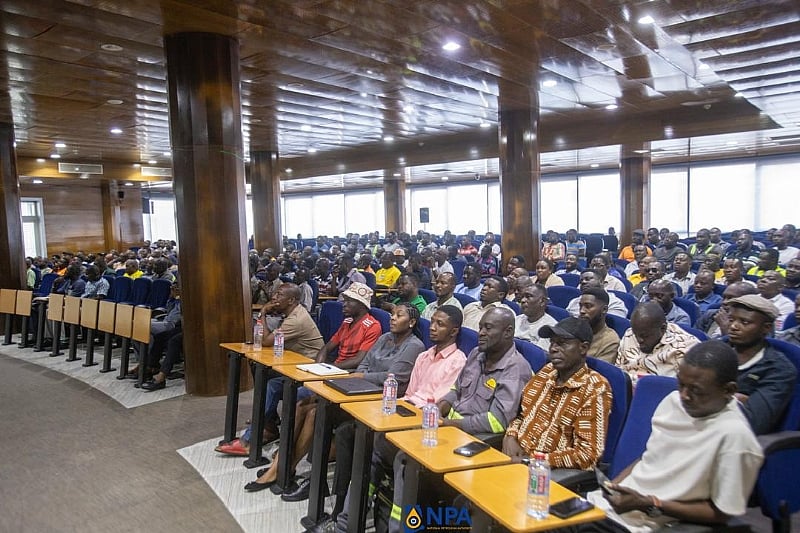The National Petroleum Authority (NPA) of Ghana recently held the inaugural Greater Accra edition of its Regional Downstream Compliance Workshop, marking a significant step towards enhancing safety and compliance standards within the country’s petroleum downstream sector. This initiative, spearheaded by NPA Chief Executive, Mr. Godwin Kudzo Tameklo, underscores a renewed commitment to stringent regulatory oversight, requiring all industry participants to adhere to established rules and procedures. The maiden workshop, held at the NPA headquarters in Accra, attracted over 300 tanker drivers, highlighting the importance of this segment of the downstream sector and the drivers’ eagerness to participate in such crucial training. This proactive approach by the NPA aims to mitigate risks, foster industry best practices, and solidify public trust in the petroleum sector.
The first day of the workshop was dedicated specifically to tanker drivers, who expressed their appreciation for the long-awaited training opportunity and encouraged the NPA to maintain such engagements. The curriculum covered critical areas vital to safe and efficient downstream operations, including the Unified Petroleum Price Fund (UPPF), Quality Assurance, Licensing, Road Safety, and Fire Safety. By addressing these key aspects, the NPA aimed to equip drivers with the knowledge and skills necessary to handle petroleum products safely and responsibly, from the loading depots to the final offloading points. This comprehensive training approach emphasized the importance of compliance throughout the entire supply chain, minimizing potential hazards and ensuring the integrity of petroleum products.
The workshop’s focus on the Unified Petroleum Price Fund (UPPF) provided drivers with insights into the mechanisms and importance of this critical component of the petroleum pricing structure. Understanding the UPPF helps drivers appreciate the broader economic implications of their role in the downstream sector. Furthermore, the quality assurance component of the training emphasized the importance of maintaining the integrity of petroleum products throughout the supply chain, ensuring that consumers receive products that meet the required standards. By educating drivers on quality control measures, the NPA aims to prevent adulteration, contamination, and other issues that could compromise the quality of petroleum products.
Licensing requirements were also a key focus of the workshop, emphasizing the importance of adhering to legal and regulatory frameworks. Proper licensing ensures that drivers are qualified and authorized to transport hazardous materials like petroleum products. This aspect of the training reinforces the NPA’s commitment to upholding industry standards and ensuring that all participants operate within the legal boundaries. The discussions on road safety provided drivers with practical guidance and best practices for navigating the roads safely while transporting flammable and potentially hazardous materials. This emphasis on road safety underscores the NPA’s commitment to preventing accidents and protecting both drivers and the public.
Fire safety training equipped drivers with the knowledge and skills needed to respond effectively in the event of a fire or other emergency. Understanding fire hazards specific to petroleum products and knowing how to use fire safety equipment are crucial for preventing catastrophic incidents. This proactive approach to safety training aims to empower drivers to handle emergency situations effectively and minimize the potential impact of accidents. The interactive nature of the workshop allowed drivers to engage directly with NPA officials and industry experts, fostering a collaborative environment for learning and knowledge sharing. This direct interaction facilitated a deeper understanding of the regulatory requirements and provided a platform for drivers to voice their concerns and seek clarification on relevant issues.
Mr. Abass Tasunti, NPA’s Director of Economic Regulations, delivering a message on behalf of the Chief Executive, urged the drivers to implement the lessons learned in their daily operations. He emphasized that compliance, from loading depots to offloading points, is crucial for protecting lives, safeguarding investments, and maintaining public trust. Mr. Ossei Yaw Danquah, Head of Business Development at NPA, commended the drivers for their active participation and assured them of continued engagement to keep them informed about evolving regulatory requirements. This commitment to ongoing communication demonstrates the NPA’s dedication to building strong partnerships with industry stakeholders. The nationwide rollout of these compliance workshops reflects the NPA’s broader strategy to strengthen accountability, improve safety, and foster stronger collaboration within the petroleum downstream sector. This comprehensive approach aims to create a more robust and resilient industry, capable of meeting the growing demands of the Ghanaian economy while upholding the highest safety and compliance standards.


